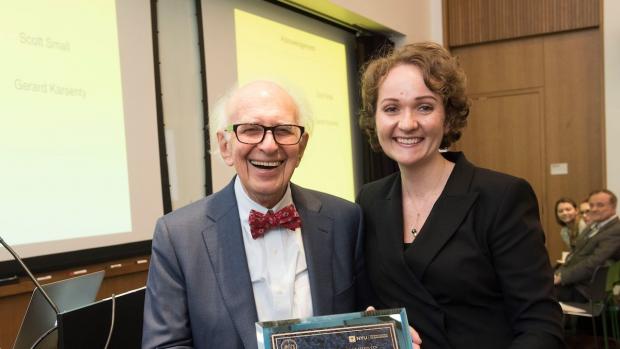Eric Kandel tackles age-related memory loss at AI seminar

Eric R. Kandel, University Professor at Columbia, Kavli Professor and Director, Kavli Institute for Brain Sciences, and a Nobel Prize winner with Professor Anna Choromanska
In 1962 Eric Kandel, a graduate of NYU School of Medicine with a residency in psychiatry under his belt, set out to explore simple forms of learning and intelligence in a small family of sea slugs inhabiting the Californian Gulf. Kandel had identified that through experimentation and observation of the Aplysia Californica, one could readily observe signs of habituation, sensitization and conditioning witnessed in the conscious and subconscious activity of the human and animal brain.
Fifty-seven years later, Kandel, University Professor at Columbia, Kavli Professor and Director, Kavli Institute for Brain Sciences, and a Nobel Prize winner for his work on memory storage and memory modelling returned to his alma mater to give a speech to a packed house at NYU’s Tandon School of Engineering. To rousing applause, he took to the dais as the final speaker at this year’s edition of the Modern Artificial Intelligence lectures at NYU’s Center for Urban Science and Progress to review his decades of research on memory acquisition and his shift to the science behind age and memory disorders.
Kandel, who once held positions in the Departments of Physiology and Psychiatry at the New York University Medical School, eventually forming the Division of Neurobiology and Behavior, began his lecture with an encomium to the celebrated neurosurgeon Wilder Penfield, whose clinical interventions involved unilateral and bilateral removal of the medial temporal lobe. He explained how these surgical treatments affected patients’ ability to convert short-term memory to long-term memory, offering tantalizing glimpses into how memories are stored in different parts of the brain.
To study how long-term memory becomes implicit and explicit memory, Kandel studied the Aplysia to understand how they learned fear (implicitly) and mice to analyze how they learned to navigate pathways (requiring explicit memory). One of Kandel’s astonishing discoveries was that repeated standardized stimulation affects anatomical changes in the brain — significant growth of the hippocampus, for example — changes that strengthen the organism’s reflexes and responses to that very stimulus.
And, he explained, this remarkable ability of stimuli to affect physical changes in the brain is not limited only to experimental animals with small, relatively simple cerebral structures.
“As a result of having to learn so much spatial information about travel in London, taxi drivers in London have a very large hippocampus. Absolutely remarkable!”, he said, ever the humorist. “And when they retire, it shrinks. What do you learn from that? Don’t retire!”
Kandel explained that the research has implications generally on how memory declines with age, and particularly on a family of emotionally crushing and financially draining maladies affecting millions of people, especially as average lifespan increases: Alzheimer’s and other forms of illnesses whose central feature is memory loss. Kandel used mice — which are not susceptible to Alzheimer’s — to explore age-related memory loss. A similar test was run on humans, where a linear decrease of memory was found due to age.
Through experimentation and transcript analysis, he discovered fundamental differences between benign memory loss and Alzheimer’s:
-
The age of onset is different. Benign memory loss begins around mid-life whereas Alzheimer’s begins in the 60s-70s.
-
Age-related memory loss affects the dentate gyrus, and Alzheimer’s affects the entorhinal cortex.
-
Alzheimer’s does not affect the same genes as age-related memory loss.
Kandel went on to advocate the use of exercise to counter this memory loss, especially running and walking, that delays the onset of age-related forgetfulness. He further emphasized the importance of social tasks and diet control to maintain and improve the cognitive functioning of the brain and preventing major memory loss and asserted his earlier message to a healthy life.
The first series of Modern Artificial Intelligence seminars kicked off in 2018 and attracted over a thousand students, faculty, and researchers to hear presentations by various stalwarts of AI and Machine Learning Research. The talks have drawn the attention of more than 4200 people worldwide and are available on view online.
Videet Rajeev Parekh
NYU Tandon School of Engineering
MS in Computer Science, Class of 2020




